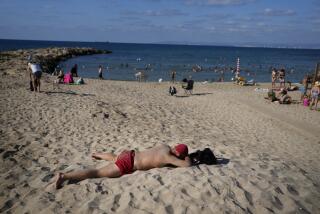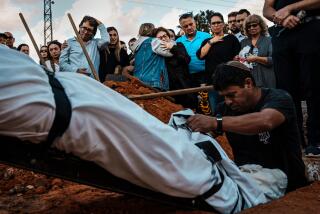Kuwait City Steels Itself for Big Battle
- Share via
WASHINGTON — With a sense of foreboding, the hundreds of thousands of Kuwaiti civilians and Iraqi troops in Kuwait city are bracing for what could be the bloody, climactic battle of the Persian Gulf War in the streets of the ransacked capital.
According to Kuwaitis and Westerners who have maintained direct contact with people inside the occupied emirate, Iraqi troops are rounding up civilians, forcing some to give blood and possibly holding others as human shields. Iraqi soldiers have even donned Kuwaiti robes in an apparent effort to fool resistance fighters--or perhaps their own commanders.
According to the reports, residents of Kuwait city are being rounded up randomly--reviving fears that Saddam Hussein will use them as human shields against an allied assault, as he did earlier with stranded Westerners and may now be doing with prisoners of war.
Iraqi troops occupying the city reportedly have forced hundreds of civilians to make blood donations--apparently in response to the massive casualties already inflicted by the U.S.-led bombing campaign or in anticipation of an imminent ground war.
With ground combat already under way near the Saudi-Kuwaiti border and an eventual allied assault on Kuwait city increasingly likely, Kuwaitis and their family members in the West are wondering about the toll that such fighting will exact on their loved ones in the combat zone.
“A lot of us are very worried about our husbands and families. But all we can really do is pray and hope. My biggest fear is, am I going to be a widow?” said Brenda Abdul-Hussain, a New York woman who escaped from Kuwait, leaving her husband behind.
The massive allied bombardment is also said to have emboldened the Kuwaiti resistance movement, touching off new firefights that have inflicted casualties on both sides.
Determined to flush out resistance fighters, Iraqi intelligence officers recently set a trap by wearing the traditional Kuwaiti robes and acting as if they were being pursued by Iraqi military police. The ruse may have worked, for it was reported that same day that five resistance fighters in the suburb of Rumaithiyah had been executed.
The reports, while unconfirmed, are considered generally reliable. Transmitted to the West almost daily by satellite telephone, fax machine and other means, they portray a city resembling a grim ghost town, its fearful residents emerging only to go to the supermarket, open just two hours a day.
Except for hungry and occasionally disorganized Iraqi soldiers seen at checkpoints around the city, there are few signs of life, according to these reports. Shops, hospitals, schools and workplaces have long been closed--or taken over by the occupation troops.
Thousands of automobiles still bearing Kuwaiti license plates have been confiscated. And last week, gasoline sales stopped without warning.
Much of the information from this covert pipeline has proven uncannily accurate, including reports of the massive oil spill nearly two days before allied officials confirmed its existence.
Above all, perhaps, the news from Kuwait raises the question of what will happen to civilians if house-to-house fighting breaks out in Kuwait city.
“Concrete basements--that’s all we have. But not all the houses have basements,” fretted Angie Saad, a U.S.-trained engineer, worried about her extended family’s fate.
“All the Kuwaitis there have been waiting for this, wanting it,” added a U.S. citizen who traveled to Kuwait several weeks before the war began. “But their biggest fear is that when the fighting starts, they’ll be sitting ducks.”
“The civilians are very vulnerable,” warned Laurie Mylroie, a Middle East analyst at Harvard.
No matter how many civilian casualties are incurred, snapped Saad, they will pale in comparison to the number of Kuwaitis who already have died at the hands of the Iraqis. “Saddam has already killed 20,000 Kuwaiti men and women,” she said.
Many of the recent accounts from Kuwait seem to indirectly confirm the bomb-damage assessments provided Wednesday by Gen. H. Norman Schwarzkopf, commander of U.S. forces in the Persian Gulf, such as the massive disruption of Iraq’s military supply lines and command and control communications.
For instance, days before Schwarzkopf showed videos of bridges between Baghdad and Kuwait being destroyed, people in Kuwait reported seeing Iraqi amphibious vehicles moving toward Iraq, carrying pontoons and other gear apparently intended to replace the vital crossing near the southern Iraq port city of Basra.
In addition, according to the reports from Kuwait, edgy Iraqi soldiers increasingly seem to be issuing conflicting orders--a sign that some interpret as a result of disrupted communications with Baghdad.
As of mid-week, according to other reports, several hundred Iraqi soldiers in Kuwait had been killed by the bombing. As a result, the Iraqis have been stopping all cars heading north from Kuwait into Iraq, ordering them to carry coffins--with dead soldiers inside--to Basra.
Kuwait city reportedly has been spared for the most part from the allied bombing, except for certain military facilities and other strategic sites--including schools and hospitals where Iraqi soldiers have set up quarters. The Iraqis now forbid nearby residents to turn on their lights after dark.
To date, the heaviest “continuous” bombardment has taken place in northern and western Kuwait, where Iraqi forces are concentrated. But the reports also say massive Iraqi casualties have been reported in the Kuwait city suburb of Sulaybiyah, where Kuwaitis believe much of the Iraqi occupation command has been located.
“Kuwaiti hospitals are full of Iraqis as a result of this bombardment,” stated one report faxed to Kuwaiti nationals in London.
In some northern Kuwaiti towns, residents have observed massive explosions in the Fao region of southern Iraq.
According to other reports from Kuwaitis:
A small group of Iraqi soldiers stationed at a western Kuwait army base fled north toward Iraq, saying the base was “full of corpses.”
Iraqi forces have set up “control points” between Baghdad and Basra designed to apprehend and execute deserters.
Mobile Scud missile launchers are being moved about, some in residential neighborhoods in suburban Kuwait city.
Convoys carrying decoy artillery guns have been heading toward the Mishref Desert.
Senior Iraqi officers in Jahra, just west of Kuwait city, have removed the insignia that show their rank.
During the bombings, a participating Kuwaiti plane was shot down by Iraqi antiaircraft artillery. The pilot reportedly ejected and was rescued by Kuwaiti resistance fighters.
On the same day the plane was shot down, one report stated, “A Kuwaiti citizen in the Khalidiyah suburb has exchanged fire with Iraqi troops and has been martyred.”
Another Kuwaiti was killed when he attempted to stop an Iraqi soldier from taking his car.
At the Rumaithiyah police station, Kuwaitis and Iraqis exchanged gunfire, resulting in the deaths of seven Iraqi soldiers.
Early last week, Iraqi troops began concealing fluorescent street markings throughout Kuwait city.
The Iraqis have seized Kuwait Radio and used it to broadcast propaganda. One night, however, it mistakenly aired a Kuwaiti patriotic song recorded by a popular Kuwaiti singer, Abdullah Ruwaishid.
More to Read
Sign up for Essential California
The most important California stories and recommendations in your inbox every morning.
You may occasionally receive promotional content from the Los Angeles Times.










